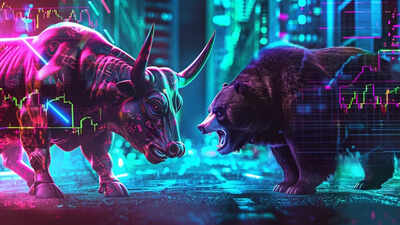Stock market crash today: Nifty50 goes below 24,550; BSE Sensex tanks over 1,100 points – top reasons for steep fall
Stock market crash today: Nifty50 and BSE Sensex, the Indian equity benchmark indices, tanked in trade on Friday on global cues. While Nifty50 crashed below 24,550, BSE Sensex tumbled over 1,100 points. At 10:53 AM, Nifty50 was trading at 24,685.85, down 202 points or 0.81%. BSE Sensex was at 81,008.09, down 684 points or 0.84%.The stock market reflected substantial losses in Asian markets following Israel’s military strikes on Iran, which intensified geopolitical tensions in the Middle East’s oil-producing region.Across sectors, Nifty Oil & Gas showed the steepest decline at 1.6%, affected by decreases in Mahanagar Gas, IGL, BPCL, and IOC shares. Nifty Bank, IT, Auto, Metal, and PSU Bank indices showed declines ranging from 1% to 1.5%. The broader market indicators also fell, with Nifty Midcap dropping 1.1% and Nifty Smallcap100 declining by 1.5%.The total market value of BSE-listed companies decreased by Rs 5.52 lakh crore to Rs 444.06 lakh crore, according to an ET report.
Why is the stock market falling today? Top Reasons
1) Israeli strike on IranThe market downturn was initiated by Israel’s military operation against Iran early Friday. Israel reported targeting nuclear installations, missile production facilities, and military leadership in what they termed a “preemptive strike” against Tehran’s nuclear weapons development.Israel declared a state of emergency, anticipating potential missile and drone counterattacks.Iranian state media confirmed Hossein Salami’s death, who served as Commander of Iran’s Revolutionary Guards. Israeli sources indicated that several high-ranking Iranian military officials and nuclear researchers were likely casualties.US Secretary of State Marco Rubio described the operation as a “unilateral action” by Israel, stating that the United States was not involved.This development occurs as nuclear negotiations remain unresolved, with the sixth round of US-Iran talks scheduled in Oman on Sunday. Dr. VK Vijayakumar, Chief Investment Strategist, Geojit Investments Limited, stated, “The economic consequences of this Israeli strike can be profound if the attack and counterattack by Iran lingers long.”2) Oil Supply Concerns Drive Price SurgeBrent crude futures rose by $6.29 (9.07%) to $75.65 per barrel at 03:15 GMT, reaching $78.50, its highest since January 27.US West Texas Intermediate (WTI) crude increased by $6.43 (9.45%) to $74.47 per barrel, touching $77.62, the peak since January 21.Both benchmarks recorded their most significant intraday gains since 2022, following Russia’s invasion of Ukraine, which caused energy prices to rise substantially.“Israel has declared that the operation will last several days. Brent crude prices have flared up by around 12% to $78. It can rise further if Iran, in retaliation, closes the straight of Hormuz, severely restricting oil supply,” Vijayakumar said.3) Global Markets Experience Widespread DeclineThe situation in the Middle East, a crucial oil-producing area, introduced additional uncertainty to global markets, which were already affected by US President Donald Trump’s inconsistent trade policies.The MSCI Asia ex-Japan index decreased by 1.1%. US S&P E-mini futures fell 1.7%, Nasdaq futures declined 1.8%, and Europe’s STOXX 50 futures reduced by 1.6%.Key Asian markets showed significant drops: Japan’s Nikkei decreased 1.3%, South Korea’s KOSPI fell 1.1%, and Hong Kong’s Hang Seng declined 0.8%.4) Safe-Haven Assets Gain on Risk AversionHeightened market caution drove investors towards secure investments. The benchmark US 10-year Treasury yields declined to 4.31%, reaching their lowest point in a month.The Swiss franc strengthened by 0.4% to 0.8072 against the dollar, whilst the Japanese yen advanced 0.3% to 143.12. Amidst widespread risk aversion, the dollar index registered a 0.5% increase to 98.131.(Disclaimer: Recommendations and views on the stock market and other asset classes given by experts are their own. These opinions do not represent the views of The Times of India)









Post Comment